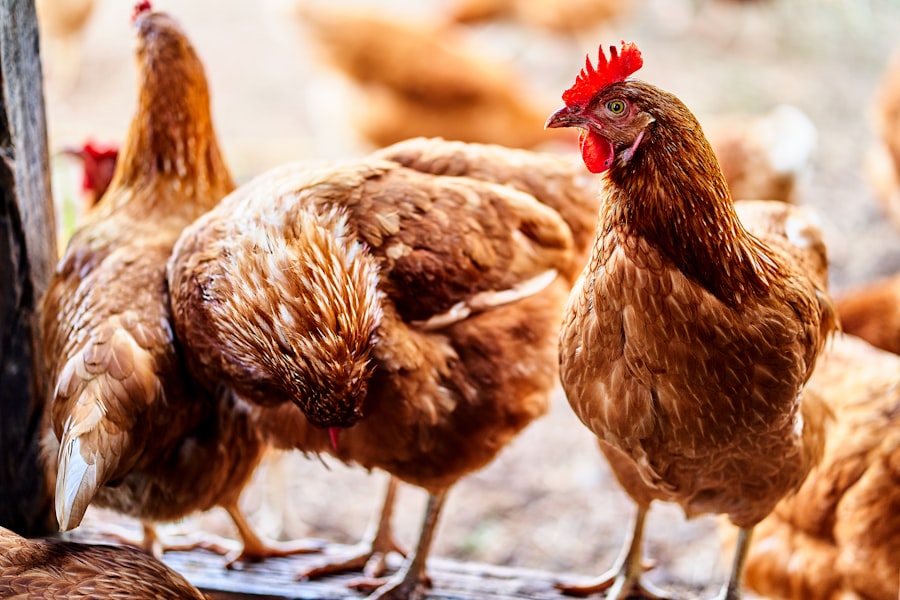Keeping chickens in your garden can be a rewarding and fulfilling experience. Not only do they provide fresh eggs, but they also offer natural pest control and fertilizer for your garden. Having chickens in your backyard can also be a great educational opportunity for children and a source of entertainment for the whole family. In this article, we will explore the benefits of keeping chickens in your garden, legal considerations, choosing the right chicken breeds, preparing your garden for chickens, building a chicken coop, maintaining the coop, ensuring the health and safety of your chickens, and ultimately enjoying fresh eggs from your own backyard.
Key Takeaways
- Keeping chickens in your garden has many benefits, including fresh eggs, natural pest control, and fertilizer for your garden.
- Before keeping chickens, it’s important to consider local laws and regulations regarding backyard chickens.
- Choosing the right chicken breeds for your garden depends on factors such as egg production, temperament, and climate.
- Preparing your garden for chickens involves creating a safe and secure space for them to roam and providing them with appropriate food and water sources.
- Building and maintaining a chicken coop is essential for the health and safety of your chickens, and should include proper ventilation, nesting boxes, and cleaning routines.
Benefits of Keeping Chickens in Your Garden
One of the main benefits of keeping chickens in your garden is the abundance of fresh eggs. There is nothing quite like collecting eggs from your own backyard and knowing exactly where they came from. Fresh eggs are not only delicious but also more nutritious than store-bought eggs. Chickens that are allowed to roam freely in your garden will have access to a variety of plants and insects, resulting in eggs that are higher in omega-3 fatty acids and vitamins.
Another benefit of having chickens in your garden is natural pest control. Chickens love to eat insects, slugs, and snails, which can be a nuisance in your garden. By allowing chickens to roam freely, they will help keep these pests under control without the need for harmful chemicals or pesticides.
Chickens also provide excellent fertilizer for your garden. Their droppings are rich in nitrogen, phosphorus, and potassium, which are essential nutrients for plant growth. By allowing chickens to roam freely in your garden or by using their droppings as compost, you can improve the fertility of your soil and promote healthy plant growth.
Legal Considerations
Before you decide to keep chickens in your garden, it is important to familiarize yourself with the legal considerations in your area. Some cities or neighborhoods have zoning laws that restrict or prohibit the keeping of chickens. It is important to check with your local government or homeowners’ association to ensure that you are in compliance with any regulations.
In addition to zoning laws, you may also need to obtain permits or licenses to keep chickens in your garden. These permits may require certain conditions to be met, such as the size and location of the chicken coop, the number of chickens allowed, and the distance from neighboring properties. It is important to research and understand these requirements before bringing chickens into your garden.
Choosing the Right Chicken Breeds
When it comes to choosing the right chicken breeds for your garden, there are several factors to consider. One of the main considerations is egg-laying ability. If you are primarily interested in fresh eggs, you will want to choose breeds that are known for their high egg production. Some popular egg-laying breeds include Rhode Island Reds, Leghorns, and Australorps.
Another factor to consider is temperament. Some chicken breeds are more docile and friendly, while others can be more aggressive or flighty. If you have children or plan to interact with your chickens regularly, it is important to choose breeds that are known for their friendly and calm nature.
You may also want to consider the size of the chicken breeds. Smaller breeds are generally easier to handle and require less space, while larger breeds may be more suitable if you have a larger garden or want to raise chickens for meat as well as eggs.
Preparing Your Garden for Chickens
Before bringing chickens into your garden, it is important to prepare the space for them. One of the first steps is to ensure that your garden is securely fenced to keep out predators and prevent chickens from wandering into areas where they shouldn’t be. A sturdy fence will also help protect your garden from being damaged by scratching and pecking.
Chickens also need access to shade and shelter. Providing a shaded area in your garden, such as under a tree or with the use of a shade cloth, will help keep your chickens cool during hot summer months. Additionally, you will need to provide a shelter or chicken coop where your chickens can roost, lay eggs, and be protected from the elements.
It is also important to consider the layout of your garden and how it will be affected by the presence of chickens. Chickens can be destructive to plants, so it may be necessary to create designated areas or raised beds for your garden that are off-limits to chickens. This will help protect your plants while still allowing your chickens to roam freely.
Building a Chicken Coop

A chicken coop is an essential part of keeping chickens in your garden. It provides a safe and secure space for your chickens to roost, lay eggs, and seek shelter from predators and the elements. Building a chicken coop can be a fun and rewarding DIY project.
When building a chicken coop, it is important to consider the size and number of chickens you plan to keep. Each chicken should have at least 4 square feet of space inside the coop and 10 square feet of outdoor space. The coop should also have proper ventilation to prevent the buildup of moisture and ammonia from chicken droppings.
Materials for building a chicken coop can vary depending on your budget and personal preferences. Common materials include wood, wire mesh, and roofing materials. It is important to choose materials that are durable, weather-resistant, and easy to clean.
Chicken Coop Design and Plan
When designing a chicken coop, there are several factors to consider. One important factor is ventilation. Proper ventilation is essential for maintaining good air quality inside the coop and preventing the buildup of moisture and ammonia from chicken droppings. This can be achieved through windows, vents, or openings near the roofline.
Another consideration is nesting boxes. Chickens need a quiet and private space to lay their eggs. Each nesting box should be at least 12 inches square and filled with clean straw or shavings. It is important to provide enough nesting boxes for the number of chickens you have to prevent competition and stress.
Roosting bars are also important for chickens to sleep comfortably. These should be placed at least 18 inches above the ground and provide enough space for each chicken to roost without crowding.
Maintaining the Chicken Coop
Maintaining a chicken coop is essential for the health and well-being of your chickens. Regular cleaning is important to prevent the buildup of droppings, which can attract pests and lead to disease. It is recommended to clean the coop at least once a week, removing any soiled bedding and replacing it with fresh straw or shavings.
Fresh water and food should also be provided daily. Chickens require clean water to stay hydrated, especially during hot weather. It is important to regularly check and clean water containers to prevent the growth of bacteria.
Feeding your chickens a balanced diet is also important for their health and egg production. A commercial chicken feed that is specifically formulated for laying hens is recommended. In addition to feed, chickens can also be given kitchen scraps, fruits, vegetables, and grains as treats.
Health and Safety for Your Chickens
Keeping your chickens healthy and safe is crucial for their well-being and productivity. Regular veterinary care is important to prevent and treat diseases. Vaccinations are available for common chicken diseases such as Newcastle disease, infectious bronchitis, and fowl pox. It is recommended to consult with a veterinarian who specializes in poultry care for guidance on vaccinations and other health concerns.
Protecting your chickens from predators is also essential. Common predators include raccoons, foxes, dogs, and birds of prey. A secure fence around your garden and coop can help deter predators, as well as using wire mesh or hardware cloth to reinforce the coop and run.
Providing a clean and comfortable environment for your chickens is important for their overall well-being. This includes regular cleaning of the coop, providing fresh bedding, and ensuring that the coop is well-ventilated and free from drafts.
Enjoying Fresh Eggs from Your Garden Chickens
Keeping chickens in your garden can be a rewarding and enjoyable experience. Not only do they provide fresh eggs, but they also offer natural pest control and fertilizer for your garden. By following the legal considerations, choosing the right chicken breeds, preparing your garden, building a chicken coop, maintaining the coop, and ensuring the health and safety of your chickens, you can enjoy the benefits of having chickens in your backyard. So why not start your own flock today and enjoy the satisfaction of collecting fresh eggs from your own garden?
If you’re considering keeping chickens in your garden, you’ll want to make sure you have the right setup to provide them with a comfortable and safe environment. One important aspect to consider is the size of the chicken coop. In an article titled “How Big Does a Coop Need to Be for a Chicken?” on PoultryWizard.com, you can find valuable information on determining the appropriate size for your coop based on the number of chickens you plan to keep. This article offers practical advice and guidelines to help you create a suitable living space for your feathered friends. Check it out here for expert insights on building the perfect chicken coop.
FAQs
What are the benefits of keeping chickens in my garden?
Keeping chickens in your garden can provide you with fresh eggs, natural pest control, and fertilizer for your garden. They also make great pets and can be a fun addition to your backyard.
What are the legal requirements for keeping chickens in my garden?
The legal requirements for keeping chickens in your garden vary depending on your location. Some cities and towns have specific regulations regarding the number of chickens you can keep, the size of your coop, and the distance your coop must be from your neighbors’ property. It is important to check with your local government to ensure you are following all regulations.
What do I need to consider before keeping chickens in my garden?
Before keeping chickens in your garden, you need to consider the amount of space you have available, the type of coop you will need, and the amount of time and effort you are willing to put into caring for your chickens. You will also need to consider the noise and odor that may come with keeping chickens.
What do chickens need to be healthy and happy?
Chickens need access to fresh water, a balanced diet, and a clean and safe living environment. They also need space to roam and exercise, as well as protection from predators.
What are some common health issues that chickens may face?
Chickens may face health issues such as mites, lice, respiratory infections, and egg-laying problems. It is important to regularly check your chickens for any signs of illness and to seek veterinary care if necessary.
What should I do with the eggs my chickens lay?
You can eat the eggs your chickens lay or give them away to friends and family. Some people also sell their eggs at local farmers’ markets or to local restaurants.
Meet Walter, the feathered-friend fanatic of Florida! Nestled in the sunshine state, Walter struts through life with his feathered companions, clucking his way to happiness. With a coop that’s fancier than a five-star hotel, he’s the Don Juan of the chicken world. When he’s not teaching his hens to do the cha-cha, you’ll find him in a heated debate with his prized rooster, Sir Clucks-a-Lot. Walter’s poultry passion is no yolk; he’s the sunny-side-up guy you never knew you needed in your flock of friends!







